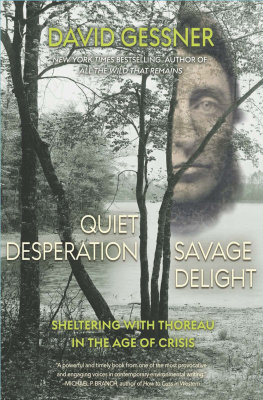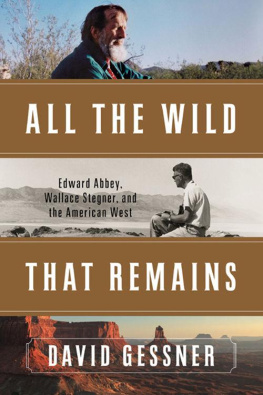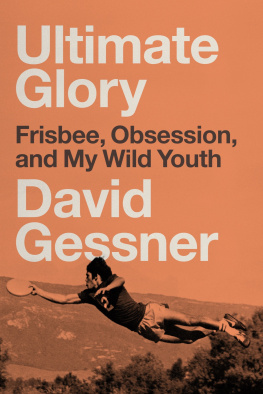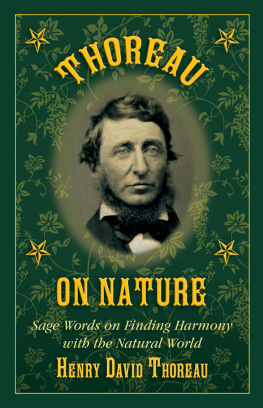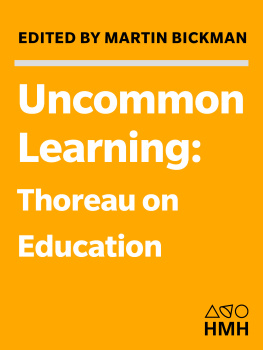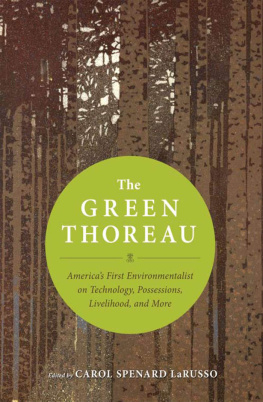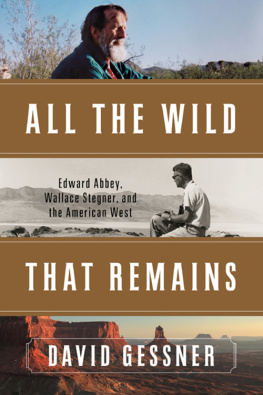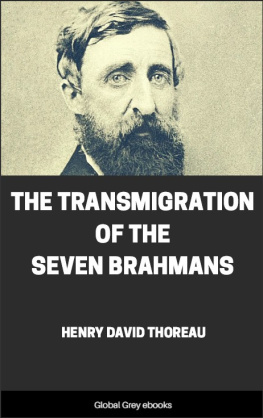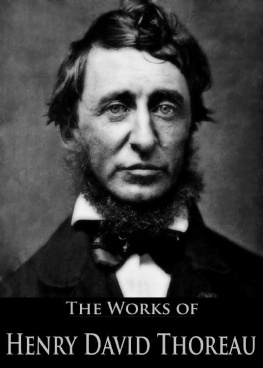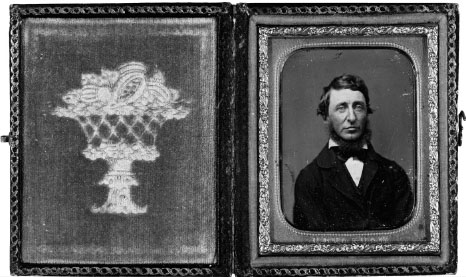Contents
Page List
Guide
PRAISE FOR
QUIET DESPERATION, SAVAGE DELIGHT
In a dynamic and illuminating exploration of the strange wilderness that has been a year of pandemic-induced seclusion, David Gessner succeeds brilliantly in using Henry David Thoreau to make sense of the quarantine, and vice versa. While the signature Gessnerian humor, irreverence, and lyricism are all here, Gessner also offers a profound meditation on how we might live, write, and parent in a bewildering age of global catastrophe. Quiet Desperation, Savage Delight is a powerful and timely book from one of the most provocative and engaging voices in contemporary environmental writing.
MICHAEL P. BRANCH, author of How to Cuss in Western
Its fashionable today to deride Henry David Thoreau as a privileged white dude mooning around a suburban wilderness. Quiet Desperation, Savage Delight doesnt deny this, but it digs deeper. Does Thoreau have anything to tell us at this vexing moment in history? For David Gessner, the answer is yes: Thoreau becomes a conduit to thinking about friendship, parenting, race, aging, technology, home, climate change, justice, and death. Gessner shows us how, rather than burying ourselves in old books, we might use them to go out and meet the world, in all its wild and broken beauty.
GINGER STRAND, author of The Brothers Vonnegut
The havoc caused by the pandemic is only a mild foretaste of what climate disruption will bring, not merely for a year or two but for the foreseeable future. To imagine how we might preserve our humanity as the world unravels, you could start by reading this lively, captivating book by David Gessner. Drawn in part from his journal of what he calls this endless night of a year, it weaves together memoir, natural history, travelogue, and literary homage to reveal a mind fully awake to our dire situation, yet able to relish birds and books, family and friends, and the living earth.
SCOTT RUSSELL SANDERS, author of The Way of Imagination
In Quiet Desperation, Savage Delight, David Gessner finds Henry David Thoreau an admirable guiding spirit for his pandemic year. But dont think of this book as a celebration of retreat from hard times or merely learning to live with less. Rather it is a book about engagement with the difficult world, about living with impermanence. A book about friendship with writers living and dead, neighbors, ospreys, skimmers, a floating shack, and a family. Reading this book is a beautiful experience, an antidote to the toxins that dominate the news.
ALISON HAWTHORNE DEMING, author of A Woven World
David Gessner is my favorite medium and his work is a reliable literary Ouija board. He consorts with and interrogates ghostsBate, Stegner, Abbey, and Teddy Roosevelt among themand now he has added Thoreau to the ghostly chorus. These are dark times. This book helps us through.
JOHN LANE, author of My Paddle to the Sea
QUIET DESPERATION, SAVAGE DELIGHT
QUIET DESPERATION, SAVAGE DELIGHT
SHELTERING WITH THOREAU IN THE AGE OF CRISIS
BY DAVID GESSNER
TORREY HOUSE PRESS

Salt Lake City Torrey

First Torrey House Press Edition, June 2021
Copyright 2021 by David Gessner
All rights reserved. No part of this book may be reproduced or retransmitted in any form or by any means without the written consent of the publisher.
Published by Torrey House Press
Salt Lake City, Utah
www.torreyhouse.org
International Standard Book Number: 978-1-948814-48-5
E-book ISBN: 978-1-948814-49-2
Library of Congress Control Number: 2020951932
Cover art by Detroit Publishing Co. and Benjamin D. Maxham
Cover design by Kathleen Metcalf
Interior design by Rachel Leigh Buck-Cockayne
Distributed to the trade by Consortium Book Sales and Distribution
Portions of Days of Wings and Water have been adapted from My Green Manifesto: Down the Charles River in Pursuit of a New Environmentalism by David Gessner (Milkweed Editions; 2011) and appear with gracious permission from Milkweed Editions.
Torrey House Press offices in Salt Lake City sit on the homelands of Ute, Goshute, Shoshone, and Paiute nations. Offices in Torrey are in homelands of Paiute, Ute, and Navajo nations.
For Brad Watson:
fellow writer and drinker
and great friend
Henry David Thoreau. Photo by Benjamin D. Maxham
CONTENTS
WHY THOREAU MATTERS NOW:
LOOKING BACK FROM THE END OF THE WORLD
WHY THOREAU MATTERS NOW:
Looking Back From the End of the World
S IXTEEN YEARS AGO, WHEN OUR DAUGHTER WAS JUST A baby, my wife and I took her on a trip to Walden Pond. As we approached the place where Henry David Thoreaus cabin once stood, with my daughter riding up on my shoulders, I said to her: Thats where the man lived who ruined your fathers life.
Ruined in a mostly good way, I meant. I discovered Walden when I was sixteen and never quite recovered. I began to question the values of the system I found myself in. The life that men praise and call successful is but one kind, Thoreau wrote, and I hollered, Amen! In this way, Thoreau was like a more profound, less musical version of getting stoned and listening to Pink Floyd, but the effect was more lasting. I began to keep a journal in high school, and I keep one to this day. After college, the sentences from Thoreaus book were still rippling outward through my life, affecting the choices I made. To hell with law school or any normal career. I would become a writer. I would value solitude. And I would move to my very own Walden.
I have been thinking about Thoreau as COVID-19 sweeps across the country. The obvious stuffhe was Americas original social distancerand the not so obvious. Thoreau can serve as a model of self-reliance, reminding us that pulling back from the world, which at the moment will save lives, has its less dramatic virtues. Having long been a corrective to our compulsive national habits of over-busyness and consumption, he can inspire just such a corrective now, but only if we try to dig below the clich of him. Because, as it happens, Thoreau was not all flowers and acorns, and this man, who died at forty-two, had some profound and sturdy thoughts not just about nature but about death and disaster. There will come a time soon, after the pandemic has subsided, when we will be trying to make sense of what has happened, when we tell a story about where we are and where we are going. And about how we have changed. For me, at least, Thoreaus ideas will be part of that story.
LET ME FIRST ISSUE A warning and disclaimer. I am wary of anyone who offers lessons from a moment of crisis. September 11 should have taught us that most of these immediate insights are disposable. And I understand that urging people to read Walden if they are sick and dying right now, or if they know others who are, is a little like the frontier priest pushing the Bible during a drought. On the evening I began typing this essay, my sister, who works as a palliative care chaplain at a hospital, texted me to say that she was tending two patients with COVID-19. One of them was fifty-eight, the other thirty-seven. By the next day, both had died and my sister was preparing grief packages for their families (the younger patient had a small child).

